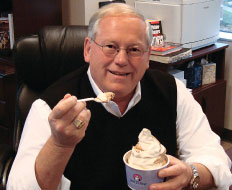Early on in his career, Jim Amos, chairman and former CEO of Tasti D-Lite, would make it his mission to track down his mentor, a business leader who hated flying so much that he would drive his personal coach around the country to various meetings and engagements.
“I would call his secretary and find out where he was, and I would fly into the city just to sit in his coach and talk to him as he was driving, and learn from him,” Amos says. “I learned a great deal from this gentleman, not just about business, but certainly about life and relationships.”
As a result of the positive influence this and other mentoring relationships had on Amos, he now preaches about the power of mentoring as a tool to pass on wisdom, technical knowledge, support, empathy, and respect to the next generation of quick-service leaders.
“The guidance is not done for personal gain; it’s done to benefit the individual,” he says. “By proxy, even if you are not altruistic, you are definitely benefiting the organization and the company.”
Other limited-service executives should embrace mentoring as a way to ensure the business entity is in good hands in the future, too, Amos says.
“Mentoring is one of the ways to strengthen the organization, because while the numbers are important to performance, they only tell you about the history of the business,” he says. “The people will tell you about what its future will be.”
Alice Elliot, a human resources and leadership consultant with clients in the quick-service world, says mentoring is especially important in the limited-service industry, which is driven by relationships both within the organization and with consumers. “It’s protecting the heritage of an industry that far transcends the individual and touches many,” she says.
All great leaders are curious and know the value of anticipation, and Elliot says these traits can be taught to others through mentoring, making the practice a vital component in developing leadership. “In the quick-service world, it helps the mentee understand the pedigree and the heritage of what they are inheriting,” she says. “It’s having a sounding board and a launching pad to be able to put one’s own leadership signature on something.”
Brand leaders can also benefit from a mentoring relationship, as the practice allows for a continuous assessment of their own personal goals and values, Amos says. “If you want to keep pace, you have to grow yourself,” he says, “and if you want to have something to give to other people, you have to be constantly learning and growing.”
Leonard Comma, president and chief operating officer of Jack in the Box, says leaders don’t necessarily have to reinvent mentoring; instead, they should tap into their own experiences with their own mentors for guidance.
Comma says he still uses valuable lessons from past mentors—like having a high code of ethics, and the value of trust and being humble—to navigate through his professional life.
“Shoot straight like an arrow,” he says, recalling one of his mentors’ lessons that he passes along to others. “Ultimately, the brutal, honest truth will serve the business best.”
The Jack in the Box leader says great mentors understand that people better retain knowledge through experience rather than through what is taught in a classroom. As a result, mentoring is a practice of leading by example.
“The way you are conducting yourself is one of the biggest determinations as to whether your people are going to be motivated,” he says. “If they are not motivated and not achieving results, you have to point fingers back at yourself.”
Mentoring can also take the form of coordinated career planning and development, which benefits not only the employee, but also the entire organization, Amos says. This allows individuals to align leadership development with the overall missions and goals of the company.
Formal individual plans also help supervisors have a better understanding of the associate’s career goals; allow associates to take personal responsibility for their career development; and present a mechanism for the organization to track leadership and development of skills.
Further, the individual plans allow quick-service organizations to create succession plans, which “are a great weakness in most of these companies today, particularly for the C-suite,” Amos says.
While mentoring is often accomplished individually, Amos says, it can also find success in a group setting. He has created a leadership council made up of individuals he mentors and who also directly report to him at work. The council meets three to four times a month to share visions and challenges.
“It is in that council where these leaders, who are in different stages of development and have different personalities, eventually stand up and stand out,” he says.
But in the end, Elliot says, any successful mentoring relationship relies on the availability of and effort put in by the person acting as the mentor.
“When it really becomes an intimate relationship, everyone understands it’s for the benefit of the organization,” she says.












